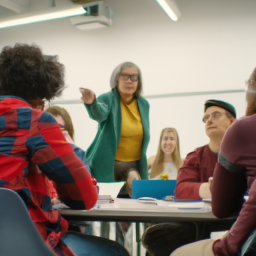Political socialization plays a crucial role in shaping individuals' political beliefs and values. While various factors contribute to this process, education has a profound influence on citizens' perspectives. Schools serve as a vital platform where young minds are exposed to different viewpoints, fostering critical thinking and civic engagement. This article delves into the significance of education in political socialization and examines the impact it has on shaping citizens' political outlook.
In many democratic societies, education systems are designed to cultivate an informed and active citizenry. The school curriculum plays a pivotal role in introducing students to key political concepts and institutions, such as democracy, governance, and rights. By incorporating civics and social studies courses, educational institutions aim to provide a comprehensive understanding of the political landscape, enabling students to develop a broader perspective.
Moreover, education encourages critical thinking, which is fundamental to political socialization. Through classroom discussions and debates, students learn to analyze political issues objectively, weigh different arguments, and form their own informed opinions. By fostering critical thinking skills, education empowers individuals to become active participants in the democratic process, contributing to the development of a politically aware society.
The media also plays a significant role in political socialization. Educational institutions can utilize various media formats, including newspapers, documentaries, and online resources, to expose students to diverse political perspectives. By encouraging students to analyze media content critically, educators can help them navigate the sea of information and develop media literacy skills necessary for informed decision-making.
Family and community environments are crucial in political socialization, and education can act as a bridge between these spheres. Teachers, as influential figures, can encourage students to share their family's political experiences and values, fostering open dialogue. Through such conversations, students gain insights into different viewpoints, promoting tolerance and understanding.
Furthermore, education empowers citizens by equipping them with the knowledge necessary to engage in political processes. By teaching students about voting, political participation, and the importance of civic duties, education encourages active engagement in the democratic process. This enables individuals to make informed decisions and contribute to shaping public policies.
By introducing students to the concept of political parties, education helps individuals understand the diverse range of ideologies and political platforms. This understanding helps citizens navigate the political landscape, assess the potential impact of policy decisions, and make choices that align with their beliefs and values.
Education also plays a role in promoting awareness of national security issues. Through lessons on diplomacy, international relations, and defense, students gain an understanding of the importance of safeguarding their nation's security. This understanding further contributes to citizens' political socialization, shaping their perspectives on defense policies and international cooperation.
Moreover, education can influence citizens' perspectives on gun laws. By providing historical context, teaching about the Second Amendment, and exploring the impact of gun violence, schools can foster informed discussions among students. Such discussions can shape their beliefs about the necessity for stricter regulations or the preservation of individual rights, ultimately contributing to their political socialization.
In conclusion, education plays a significant role in political socialization by exposing students to diverse perspectives, fostering critical thinking, and promoting civic engagement. By incorporating civics education, encouraging media literacy, and facilitating open dialogue, schools contribute to the development of politically aware and active citizens. As education shapes citizens' political outlook, it becomes crucial to prioritize the inclusion of comprehensive and balanced curriculum to ensure the cultivation of informed and responsible citizens.
